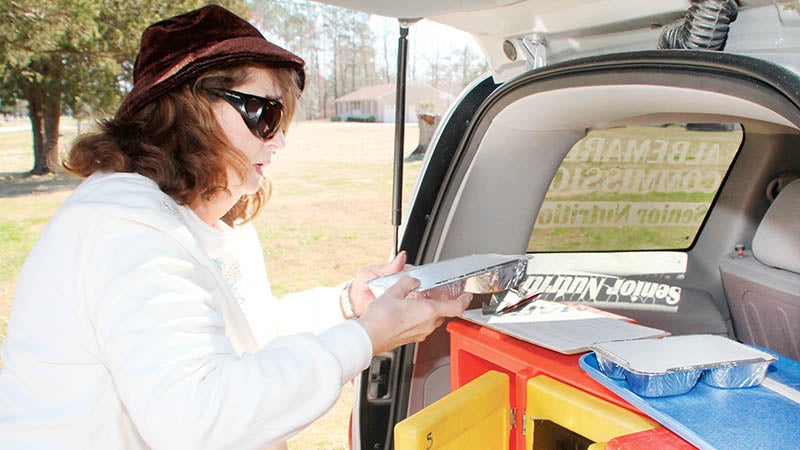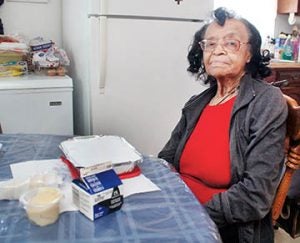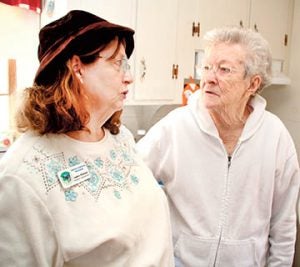Hot lunch; warm smiles
Published 11:21 am Monday, April 3, 2017

- Audrey Holland, Volunteer Administrator for the Albemarle Commission’s Senior Nutrition Program, prepares to deliver a meal to a senior citizen in Gates County. | Staff Photos by Cal Bryant
SUNBURY – They’re more than just a nutritious meal packed neatly inside a disposable container. The real treat comes with the broad smiles and friendly words shared by those both giving and receiving.
Meal on Wheels is a national program designed to provide nutrition to homebound senior citizens that are no longer able to cook for themselves. However, the program comes complete with added benefits, most importantly allowing these senior citizens to remain independent and in their own homes for as long as possible.
Locally there are approximately 50 Meals on Wheels routes in the 10-county region served by the Albemarle Commission. On Monday through Friday of each week, the Commission is responsible for a total of 750 meals, roughly half of which are home delivered while the others are served at congregate sites in each of the 10 counties.

Sadie Wiggins poses with her meal as sits at the kitchen table of her home located outside of Sunbury.
Using local churches as distribution points, the food arrives each weekday from the caterer, all safely tucked away inside bright orange and yellow containers – one each for hot and cold items.
The Albemarle Commission has contracts with three caterers who prepare the meals. In the case of Gates County meal recipients, Golden Corral of Elizabeth City is the caterer, as they are in Chowan, Pasquotank and Perquimans counties. They cook and pre-package the meals, and deliver the containers to each of three distribution sites in the Gates County by 10 a.m.
From there, volunteers literally take the wheel, picking up their containers and delivering to those on their route. In Gates County, 61 volunteers rotate their schedules to either deliver a total of 30 home-delivered meals on four different routes (Sunbury/Corapeake, Gates, Eure, and Gatesville) or work at the Community Center where 12 congregate meals are served on weekdays.
Audrey Holland has served for the past 11 years as the Volunteer Administrator for the Albemarle Commission’s Senior Nutrition Program, based in Hertford. She began as a volunteer deliverer, eventually becoming the administrator for the program. Her mother delivered for 30 years in Perquimans County, eventually failing in health to the point where she became a Meals on Wheels recipient.
“It can be hard at times getting volunteers to sign on with you and maintain those schedules,” Holland said. “Because we deliver five days a week – rain, shine or holiday – we like to keep at least 15 volunteers per route. That makes it more feasible for someone to volunteer only a few hours per month.”
Holland added that every effort is made to ensure that the delivery routes can be covered in 60 minutes or less.
“There are some that take a little over one hour to cover; typically they are the ones with 10 or more stops, but we try to keep them at no more than 12 stops per route,” she stressed.
New volunteers serve initially as “ride-alongs” until they learn the route.
Each route contains a detailed list of travel directions for the volunteer to follow. That list also contains the name(s) of the recipient(s) at each stop. The volunteer typically places the meal(s) where instructed by the recipient. The volunteer will ask if the meal is to be consumed immediately. If the answer is no, then they typically inquire of the recipient if they would like to meal placed in the refrigerator.
If a recipient is not at home when the meal is delivered, the volunteer will leave a “door hanger.” That card informs the recipient to call the Commission and leave information regarding the next scheduled delivery date.

Audrey Holland (left) chats with Meals on Wheels recipient Marian Spivey after delivering a nutritious lunch to the Gates County resident.
“There are times when a recipient will call in advance and say they will not be home on a particular day due to a scheduled doctor’s appointment or another reason,” Holland noted. “But then there are times when emergencies arrive and they have to leave unexpectedly. We understand in those circumstances that receiving a meal at a particular time is the furthest thing from their mind.”
Those at home when the meal arrives are thrilled on two accords – one to see a friendly face and enjoy their company for a brief period of time; and two, for the opportunity to enjoy a nutritious meal. On this particular day, the menu consisted of spaghetti with meat sauce, California-blend vegetables, baked spiced apples, garlic bread, pudding for dessert and a single serving of two percent milk. Each item was charted with individualized nutritional values, to include calories, fat percent, and the total amount of sodium, calcium, protein, fiber, and carbohydrates.
Linie Briggs was inside her home located just east of Sunbury when the meals arrived for she and her husband.
“I feel bad that I’m in no shape to cook, but this old arthritis has got me down,” Briggs said, sitting in a recliner where she has busied herself this morning to read a few magazines. “I really enjoy these meals. Without this (Meals on Wheels) I’d be in bad shape.”
Briggs added that family and friends prepare breakfast and dinner for her and her husband.
“Meals on Wheels makes me happy in my heart,” Briggs said. “If I wasn’t down like I am health wise, I’d be out there doing what ya’ll are doing for me today, and that’s helping those in need. Thank ya’ll for what you do.”
Sadie Wiggins was sitting inside her Sugar Run Road home watching the “Price is Right” when her daily lunch meal arrived.
“Thank you so very much; God bless you,” said Wiggins, sitting at her dining room table. “I enjoy these meals so much, and they’re so good. I use to be able to cook like this, but my eyes have failed me in my old age.”
Marian Spivey was standing in her kitchen as the Meals on Wheels volunteer arrived.
“I certainly enjoy these meals,” Spivey said. “They are a big help to me. It takes me a while to get going in the mornings. I once enjoyed cooking, but now it’s so different with health issues.”
To qualify for a home-delivered meal, the recipient must be homebound, over the age of 60, and unable, physically or mentally, to prepare a nutritious meal for themselves (and spouse where applicable). A doctor is required to verify that the recipient will benefit from being in the program.
If they are able to drive or physically mobile to the point where they can take advantage of other types of transportation (in Gates County, GITS {transit vans} is the popular choice), the meals are also available at the congregate site at the Community Center.
An individual can be referred by a doctor, by hospital staff upon being released from a medical facility, by a social worker/case manager, or refer themselves to the program. After that reference is made, a member of the Albemarle Commission staff will make a home visit for verification and collect other needed information.
“One of the great benefits of this program is that those receiving these meals are still in their homes, which is a lot cheaper than having to reside in an assisted living or nursing facility,” Holland observed. “Studies have shown that people tend to live longer when they remain within their home environment.
“It also serves another purpose as a safety net because there’s always a volunteer coming in five days a week checking on their welfare,” Holland added. “In some cases, our Meals on Wheels volunteers are the only faces these individuals see week-to-week, especially where the recipients do not have family members living in close proximity.”
In cases where the volunteers notice something not right with the recipient, they contact the Albemarle Commission office who, in turn, has emergency contact numbers on file for that individual.
The social contact has other benefits.
“I’ve read where socialization for those that are elderly helps put off on the onset of dementia and helps keep them alert and aware of their surroundings,” Holland remarked.
The Meals on Wheels program is constantly in need of volunteers to work established routes or in cases where the Albemarle Commission is planning to add new routes.
To sign-up as a volunteer or to receive more information, contact Holland at 252-426-7093 (ext 230) or by email at aholland@accog.org.



